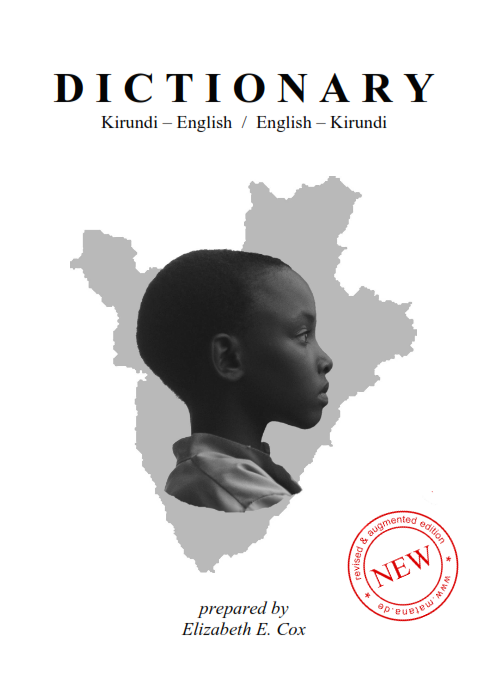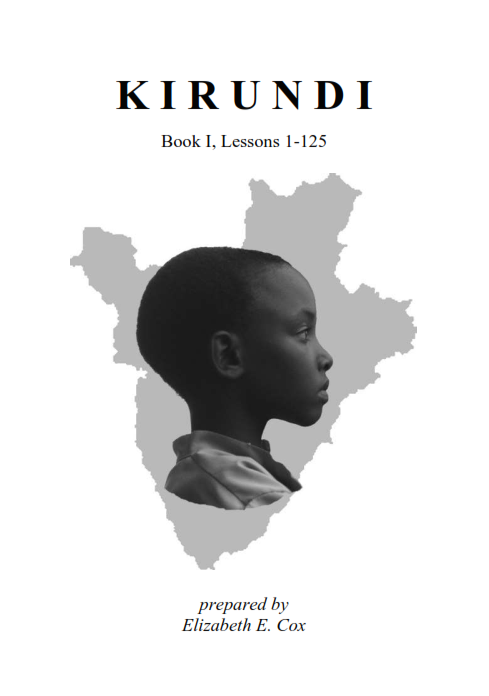kraal ▶ urugo
(entrance to king's) ikirīmba
(head of) sēnaka
(owner of) umutūngwa, nyene
(with many houses of members of one family) ikigwati
(within the kraal) intangāro
(entrance to king's) ikirīmba
(head of) sēnaka
(owner of) umutūngwa, nyene
(with many houses of members of one family) ikigwati
(within the kraal) intangāro
En-En dictionary
muraduha excl ▶ called before entering kraal (knocking being impolite) (from guha)
ikirīmba (ibi-) 4 class 4
singular: iki-,ic-
plural: ibi-,ivy- ▶ entrance to king's kraal
singular: iki-,ic-
plural: ibi-,ivy- ▶ entrance to king's kraal
kurēmbeka (-rēmbetse) v ▶ to put 'medicine' about kraal to keep away thieves and evil spirits
kwūgarira (-ūgariye) v ▶ to close the entrance of the kraal
grass ▶ ivyātsi, ubwātsi
(kind poisonous to cows) inzūzi
(pieces of a certain kind used for weaving) agatēte
(tall) ubwātsi
(in water) igikāngaga
(~ knife) umupānga
(to cut) gukera, gukerera, gutema
(to cut for use) kwāhira
(to dig out rapidly) gusūriranya
(to gather up that which has been spread out) gusasūra
(to leave grass growing in kraal) gutongoza
(to spread) gusasa
(to spread around something, as coffee) gusasira
(to weed out quickly) kurandagura
(kind poisonous to cows) inzūzi
(pieces of a certain kind used for weaving) agatēte
(tall) ubwātsi
(in water) igikāngaga
(~ knife) umupānga
(to cut) gukera, gukerera, gutema
(to cut for use) kwāhira
(to dig out rapidly) gusūriranya
(to gather up that which has been spread out) gusasūra
(to leave grass growing in kraal) gutongoza
(to spread) gusasa
(to spread around something, as coffee) gusasira
(to weed out quickly) kurandagura
En-En dictionary
sēnaka (ba-) 1 class 1
singular: umu-
plural: aba- ▶ head of the kraal
singular: umu-
plural: aba- ▶ head of the kraal
ikigwati (ibi-) 4 class 4
singular: iki-,ic-
plural: ibi-,ivy- ▶ kraal with many houses of members of one family
singular: iki-,ic-
plural: ibi-,ivy- ▶ kraal with many houses of members of one family
umutūngwa (aba-) 1 class 1
singular: umu-
plural: aba- ▶ honored person, owner of kraal
singular: umu-
plural: aba- ▶ honored person, owner of kraal
king ▶ umwāmi
(entrance to king's kraal) ikirīmba
(house of) ingoro
(pronouncements or commands sent out to chiefs) amatēka
(to become) kwīma
(to die) gutānga
(to make) kwīmika
(to sit) kuvyāgira
(to speak evil of ~) kurogota
(entrance to king's kraal) ikirīmba
(house of) ingoro
(pronouncements or commands sent out to chiefs) amatēka
(to become) kwīma
(to die) gutānga
(to make) kwīmika
(to sit) kuvyāgira
(to speak evil of ~) kurogota
En-En dictionary
charm ▶ (heathen) igihēko
(heathen, worn on head) urugori
(used by witch doctor) urukorōnko, inkorōnko
('medicine' smeared about kraal to keep away thieves and evil spirits) ururēmbeko
(spell, hex) amarozi
(white shell worn by children) iyugi
(heathen, worn on head) urugori
(used by witch doctor) urukorōnko, inkorōnko
('medicine' smeared about kraal to keep away thieves and evil spirits) ururēmbeko
(spell, hex) amarozi
(white shell worn by children) iyugi
En-En dictionary
leave ▶ (to) guheba, kujījūka, kureka, gusiga, kugēnda, kuvaho, gutāha
(at, for) kurekera, gusigira
(abruptly) kwōnjorora
(behind) gusiga
(country) kwāmbuka, guhaba
(country because of famine) gusuhūka
(grass and stuff growing in kraal) gutongoza
(group and go by oneself) kujōnjōra
(inheritance) kuraga
(intention or place) gucungūra
(open) kurāngāza
(out) guhaza
(over) gusigaza
(place) gushingūka
(something with someone) kubītsa
(with) gusigarana
(at, for) kurekera, gusigira
(abruptly) kwōnjorora
(behind) gusiga
(country) kwāmbuka, guhaba
(country because of famine) gusuhūka
(grass and stuff growing in kraal) gutongoza
(group and go by oneself) kujōnjōra
(inheritance) kuraga
(intention or place) gucungūra
(open) kurāngāza
(out) guhaza
(over) gusigaza
(place) gushingūka
(something with someone) kubītsa
(with) gusigarana
En-En dictionary
marry ▶ (each other) kwābīrana, kuragana
(each other, rude) kurongorana
(of bride) kwābīrwa, kurongorwa
(of groom) kwābīra, kwēnda (rude), kurongora
(a widow and go to her kraal) gucūra
(to refuse, esp. girl to refuse to marry a certain man) kubēnga
(to take wife without marrying her properly) gucīkiza
(to go to husband without being married) gucīkira
(each other, rude) kurongorana
(of bride) kwābīrwa, kurongorwa
(of groom) kwābīra, kwēnda (rude), kurongora
(a widow and go to her kraal) gucūra
(to refuse, esp. girl to refuse to marry a certain man) kubēnga
(to take wife without marrying her properly) gucīkiza
(to go to husband without being married) gucīkira
En-En dictionary
ururēmbēko (in-) 6 class 6
singular: uru-
plural: in- ▶ 'medicine' smeared about kraal to keep away thieves and evil spirits
singular: uru-
plural: in- ▶ 'medicine' smeared about kraal to keep away thieves and evil spirits
medicine ▶ umuti
(for diarrhea) umufutisho
(to make one to talk freely, to release inhibitions) urudedēmvya
(to make people like one) urusango
(material smeared about kraal to keep away thieves and evil spirits) urugombeka, ururēmbeko
(to ask for ~ to counteract poison) kurogōza
(to put out ~ to keep away thieves and spirits) gutota, kurēmbeka, kugombeka
(for diarrhea) umufutisho
(to make one to talk freely, to release inhibitions) urudedēmvya
(to make people like one) urusango
(material smeared about kraal to keep away thieves and evil spirits) urugombeka, ururēmbeko
(to ask for ~ to counteract poison) kurogōza
(to put out ~ to keep away thieves and spirits) gutota, kurēmbeka, kugombeka
En-En dictionary
thieves ▶ (to put 'medicine' about the kraal to keep away ~ and evil spirits) kurēmbeka
En-En dictionary
gucūra (-cūye) v ▶ 1. to marry a widow and go to her kraal, 2. to bring a wife back that's gone home, 3. to lead or send back (esp. cows), 4. to address the people (used only of king or other authority)
icānya (ivy-) 4 class 4
singular: iki-,ic-
plural: ibi-,ivy- ▶ place surrounding great chief's kraal, good pastures
singular: iki-,ic-
plural: ibi-,ivy- ▶ place surrounding great chief's kraal, good pastures
intangāro (in-) 3 class 3
singular: i-,in-
plural: i-,in- ▶ within the kraal, courtyard
singular: i-,in-
plural: i-,in- ▶ within the kraal, courtyard
urugo (in-) 6 class 6
singular: uru-
plural: in- ▶ 1. kraal, 2. enclosure about house and yard, 3. household
singular: uru-
plural: in- ▶ 1. kraal, 2. enclosure about house and yard, 3. household
kraal found in: Kirundi I (Study lessons)
lesson 108 ▶ Adverb –te? Comparisons
lesson 118 ▶ Some Adverbs; The –raca– Tense










 printable PDF files.
printable PDF files.

 This unique dictionary by Betty Cox is known for the deep cultural insight it provides to many Kirundi terms. It has been thouroughly revised, adapted to present-day Kirundi orthography rules and many new words and meanings have been added.
This unique dictionary by Betty Cox is known for the deep cultural insight it provides to many Kirundi terms. It has been thouroughly revised, adapted to present-day Kirundi orthography rules and many new words and meanings have been added. The Kirundi self study course guides you through 125 lessons and makes you learn both the necessary vocabulary and basic grammar.
The Kirundi self study course guides you through 125 lessons and makes you learn both the necessary vocabulary and basic grammar. English pronunciation by
English pronunciation by


